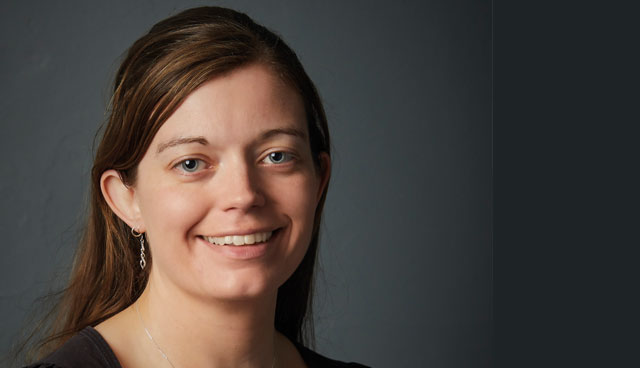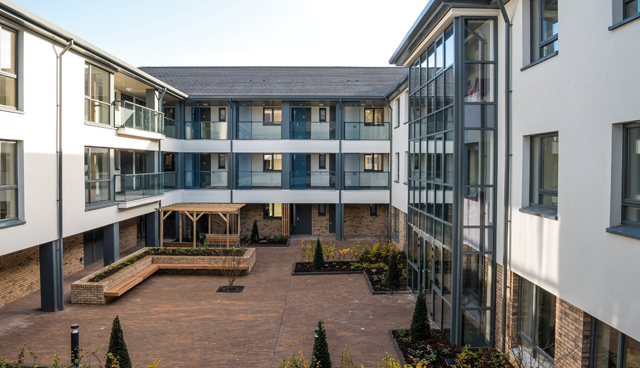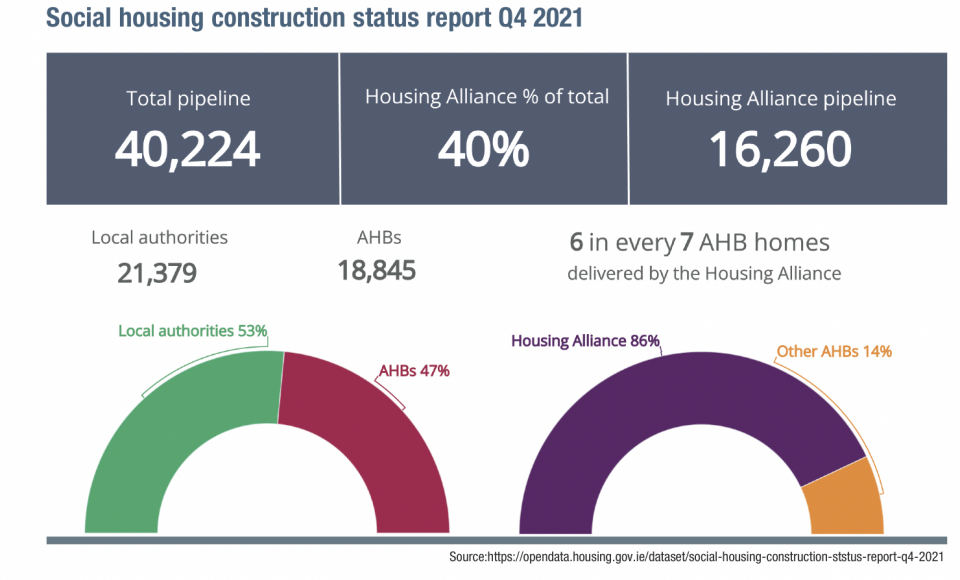
ROUNDTABLE DISCUSSION: Ireland’s sustainable housing future
4th July 2022
Housing Minister Darragh O’Brien: Delivering Housing for All
4th July 2022COVER: A powerhouse of delivery

Ciarán Galway visits Laytown, County Meath to discuss priorities, consolidation, and professionalisation with Circle Voluntary Housing Association (VHA) Chief Executive and Housing Alliance chair, John Hannigan.
Established as a general need family housing association in 2003, having trebled in size in the past five years, Circle VHA now operates in 21 local authorities and manages more than 2,500 homes. The approved housing body (AHB) also partners with disability, mental health, and homeless organisations on the provision of suitable housing and facilities management.
Primarily focused on two- and three-bedroom houses or apartments, in the next two years, Circle VHA, in collaboration with its developers, will seek to deliver more one-bedroom apartments.
Indeed, since the launch of Housing for All, the Government’s housing plan to 2030, the Circle VHA chief has identified a significant increase in pressure to deliver more homes. Having delivered an average of 100 homes per annum over the past three years, the AHB’s pipeline for 2022 will increase to between 200 and 250 homes. In 2023 and 2024 this figure will rise again to 500 and 1,000, respectively.
“In total, our current pipeline for delivery is 1,500 homes in the next 24 months,” Hannigan says, adding: “Government would like us to prioritise this more and understandably so.”
At the same time, with 2,500 existing tenants, Circle VHA has prioritised a move towards a more tenant-first approach, ensuring that tenants are at the forefront of what it does. “This includes, for instance, initiating a Tenant Advisory Group which will assist in bringing tenants onto the Circle board as part of our organisational governance.
“As such, we have already established four key groups with tenants to determine the content of our policies and how they are issued,” he notes.
Values
When Hannigan first joined Circle VHA, “no one could define what its values were”. However, having undertaken a process to instil an agreed set of values in everyone across the AHB, it is now defined by its ‘WE HEAR!’ values.
WE HEAR! is an acronym of:
• Willingness: A willingness to embody all our values in a driven manner, “going above and beyond what others are doing”.
• Empowerment: Empowering staff to take timely decisions conducive to quality of the service provided, while also empowering tenants “to be central to what we do”.
• Honesty: Providing an honest and fully transparent approach to all decisions and outcomes, creating a space for constructive criticism that enables growth.
• Excellence: Consistently exploring what excellence is and how it is delivered, “we see it as a day-to-day priority”.
• Accountability: Ensuring that everyone across the organisation is held accountable for what they do or do not do.
• Respect: Giving everyone the respect they deserve, regardless of who they are, where they come from, what their background is, whether they are a tenant or a member of staff. “That was not always in existence, whether in our organisation or across the sector,” Hannigan acknowledges.
Challenges
As experienced across society and the economy generally, inflationary pressures are having a disruptive impact on the housing sector. From materials such as timber and steel, to labour, the cost is increasing.
“Our other difficulty is acquiring completed homes. Encouraging developers and builders to build and at pace is really difficult. In fairness to them, they are indicating that supply chains are constrained, and labour shortages are having a significant impact at this time also,” Hannigan explains.
“The social housing sector has an unprecedented awareness of what is being delivered. As a result, homes are being bought up or built up more rapidly than previously. However, it is still insufficient. For example, in 2022, the target for our sector is to deliver nearly 9,000 social homes. At the moment, we are running at about 7,700 for the year.

“That figure is a result of constrained house completions. Consequently, we have a 1,300-home deficit that we are trying to close. That is proving difficult, but it is something that we can achieve.”
Regulation
From 1 January 2022, the Approved Housing Bodies Regulatory Authority (AHBRA) assumed responsibility for establishing and maintaining the register of AHBs and for registering organisations as AHBs.
As larger AHBs have been “voluntarily regulating for seven years”, disruption has been minimal. However, for smaller AHBs, the weight of additional governance costs is a challenge.
“That is not going to be sustainable,” Hannigan observes, noting: “We will see more and more smaller AHBs handing over the keys and asking to be managed by a larger organisation.”
While suggesting that this is “not necessarily a bad thing”, the Circle VHA chief warns against a complete erosion of localism. “Having a large national organisation doing everything may inhibit a sense of ownership and a sense of community that smaller AHBs develop. There needs to be a balance,” he says.
Circle VHA has welcomed statutory regulation as an opportunity “from a funding perspective”. “I have been having conversations with funders whereby they have indicated that statutory regulation has been one of the factors that has enabled them to come to the market. Without it, we could not deliver as many houses as we aim to into the future,” he relays.
Professionalisation
Hannigan also chairs the Chartered Institute of Housing (CIH) Ireland, a membership organisation tasked with professionalising the housing sector and creating a clear and valued career path in housing. Having initially struggled to become established, the CIH is attempting to expand its relatively low membership in Ireland and demonstrate that there are real careers in the housing profession.
“Our tenants have an expectation that they receive the best possible service from the best people; professionals who know what they are doing with the required level of training, expertise, CPD, and all the things that go into making somebody competent in their role. The CIH, working with the Irish Council for Social Housing [ICSH], is there to ensure that can happen,” he explains.
As a member of the governing board of the CIH in the UK, Hannigan has insight into the jurisdictional challenges elsewhere, for instance, in Canada, China, the UK, Australia, and New Zealand. “It is particularly beneficial because you can discern what works, sidestep the pitfalls, and achieve desired outcomes more swiftly,” he comments.
Simultaneously, sitting on the board of the ICSH, the umbrella body for all AHBs, Hannigan identifies the potential for synergy between statutory regulation, professional standards, and the consolidation of AHBs.
“I will utilise all my roles to bring coherence to the CIH, promoting membership and simultaneously deliver a better package for members, that compliments the role played by ICSH for its corporate members,” he states.
Housing Alliance
Having sat on the board of the Housing Alliance for four years, and previously serving as its vice chair on two occasions, Hannigan was appointed chair in April 2022. Describing the Alliance as “a powerhouse of delivery”, he emphasises that between them, the six constituent AHB members currently deliver two-fifths of all social housing in the State.
Given that “there is no group more committed than the six Housing Alliance members in terms of housing delivery”, its role, the Alliance chair explains, is to provide an expert voice in support of government efforts to remove all barriers to housing delivery.
However, while emphasising the scale of the AHBs involved, the Housing Alliance chair maintains that “we are not taken as seriously as we should be”. “I do not think we are leveraged enough by the State in terms of how we do things,” he continues, explaining: “Between the six AHBs, the Housing Alliance has thousands of years of housing experience. Yet, we still get asked questions which demonstrate that we are regarded as amateurs because we are charities.”
For instance, Circle VHA’s senior leadership team exhibits decades’ worth of experience in building and delivering houses, alongside its tenancy management function. “The other five AHBs around us have similar or greater levels of experience. My job this year, is to amplify that message and enhance the visibility of the Housing Alliance.
“I want to ensure that we are correctly regarded as organisations that deliver solutions and positive outcomes for the people that need housing. We are going to spend a significant amount of time proposing the solutions that I believe will help government achieve its ambition of delivering more housing for more people,” he insists.
Consolidation
Consistent in his message, Hannigan contends that the social housing sector is oversubscribed. Consolidation, he advocates, will be the natural fallout of regulation and good governance requirements, alongside economic headwinds. “We will have no choice but to consolidate more and more AHBs,” he projects.
“Depending on who you talk to, there is a total of between 450 and 574 approved housing bodies in Ireland,” he says, continuing: “The reality is, however, there are only around 100 AHBs which are very active and another 100 which are partially active.”
While emphasising that there is a role for localism, with small AHBs fulfilling that function, Hannigan emphasises the realities of regulation and associated governance. “Smaller organisations, managed by volunteers, are going to struggle” he asserts.
“I believe that smaller AHBs should coalesce under an umbrella organisation, whether that is Circle VHA, the Irish Council for Social Housing, or a separate entity.”
Highlighting an exemplar case study in which several small AHBs coalesced under an overarching group in Limerick, the Circle VHA CEO indicates that this empowered the organisations to meet their regulatory requirements.
At the other end of the AHB spectrum, the six largest AHBs constitute the Housing Alliance. However, Hannigan believes that none – with the possible exception of Clúid Housing – “are at the scale we should be at in order to benefit from real economies of scale”. What is required to be truly economical, he contends, is an alliance of between eight and 10 AHBs that manage a combined total of 10,000 homes each.
“Circle’s intention is to attempt to drive that. We have been very public about it; we take every opportunity to talk about it. We have entered several discussions and I would hope that we would see some positive outcome from those within the next six months,” he reveals.
Ambitions
Looking ahead to the next three years, the Circle VHA CEO reiterates the importance of establishing a tenant-first approach. “We want to be identified as leaders and innovators, ensuring that tenants have real say in how we build, what we build, the nature of the services we provide, and how we build communities. Tenants must be at the forefront of that process,” he insists.
A second priority is growth, both in terms of growing Circle VHA and the number of homes it provides, Hannigan regards the housing crisis as a deeply entrenched challenge. “Unfortunately, I think we are 10 years out from seeing the crisis relieved to a point where it is no longer the difficulty it currently is. We have a long-term challenge to deal with and Circle will be at the forefront of the solution,” he concludes.
| Profile: John Hannigan
John Hannigan has been Chief Executive Officer of Circle Voluntary Housing Association since 2017. He took up his current position in September 2017. Having previously held the position of Managing Director of Sunbeam House Services since 2010, John also worked as finance director with Respond. John is currently the Chair of The Housing Alliance, comprising six of the largest Housing Associations in Ireland. As well as being a Fellow and Chair of the Chartered Institute of Housing (Ireland), alongside his membership of the governing board of Chartered Institute of Housing (UK), John also holds a seat on the Board of ICSH and is also a Fellow of the Association of Certified Accountants, and a Chartered Director with the Institute of Directors. |





